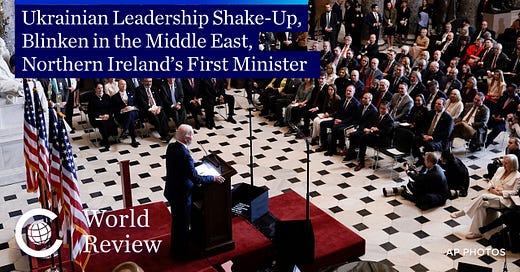World Review: Ukraine Leadership Shake-Up, Blinken in the Middle East, Northern Ireland's Government
A brief synopsis of this week's show
Each Friday morning, I host a video podcast called “World Review with Ivo Daalder” where three journalists from major news outlets around the world join me in discussing the latest global news stories of the week.
This morning, February 9, I was joined by Laura Bárron-Lopéz of the PBS NewsHour and Philip Stephens of the Financial Times.
While I encourage you to watch or listen to the episode (and subscribe wherever you get your podcasts!), here are three interesting things I took away from our discussion today:
The US presidential election may be 9 months away, but it is already having an indelible impact on US politics and foreign policy. Laura described this vividly in recounting the machinations of Republican Senators as they tried to squeeze out of the bind they found themselves in this week. Having succeeded in getting the Democrats and White House to accept unprecedented border security policy changes (without any of the immigration reforms Democrats have long insisted would have to be part of such a bill), the Republicans refused to take “yes” for an answer. They voted against the bill that included aid for Ukraine, Israel, Taiwan, and the very border security measures they’d insisted on as the price to approve the aid requests. The failure had profound implications in Europe, which had moved out earlier in approving some $54 billion of new assistance for Ukraine, by giving Europeans an early taste of what a return of Donald Trump to the White House might mean for their security. It also further dampened morale in Ukraine, where a failed counter-offensive last fall, increased Russian military activity along the entire front and against cities, and dwindling arms supplies was further depressing morale.
Antony Blinken traveled to the Middle East for the fifth time since the October 7 attacks, seeking to negotiate a prolonged pause in the Gaza fighting to allow for the release of hostages and set in motion efforts towards a long-term solution to conflict in the region. He came back empty handed. Hamas raised the price for releasing hostages, and the Israeli government affirmed that only further military pressure would lead to their release. The Saudis also announced that the price for their support, including normalization of relations with Israel, was recognition of a Palestinian state, an end to fighting in Gaza, and the withdrawal of Israeli troops. Philip describe thinking in European capitals on the crisis in ways that are equally applicable in Washington: deep frustration, sometimes turning to anger, but combined with a sense of impotence. That frustration and anger was on display on Thursday evening, Laura reminded us, when President Biden accused Israel of activities in Gaza that were “over the top.” Meanwhile, Benjamin Netanyahu continues to insist on total victory, prolonging a war that is, for now, keeping him in power.
Some good news this week in a place that has had its fair share of tragedy. Northern Ireland has a government, for the first time in two years, which is led for the first time ever by Sinn Fein—the nationalist party (and former political wing of the Irish Republican Army) that favors Ireland’s unification. That new reality reflects profound demographic changes in Northern Ireland and brings the prospect of Irish unification into the discussion for the first time since its partition in 1921. But, Philip warned, unifying the two entities will not be easy. One million people in the North are firmly committed to staying in the Union, and their political and cultural identity is very different from those who seek eventual unification. This is not like German unification (itself a very costly endeavor) and it will take much more time and effort to foster the necessary agreement to move forward on ending partition.
That’s it for my quick takes of this week’s episode here on America Abroad. To get the full flavor, please listen to the episode itself.





